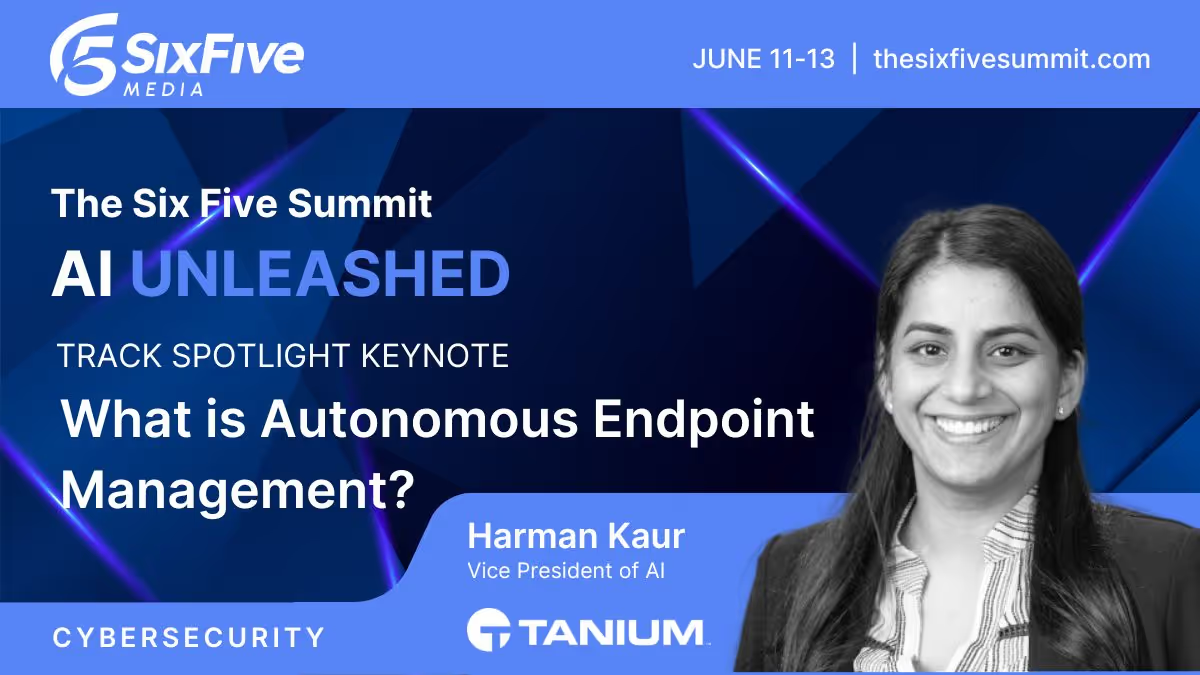AI, Security, and Mission Momentum: Inside Google’s Public Sector Strategy
Elizabeth Moon, Managing Director at Google, joins Patrick Moorhead to discuss Google Public Sector’s AI-driven innovations, advanced security strategies, and recent momentum in serving federal agencies with mission-critical cloud solutions.
How are AI-driven secure cloud innovations transforming mission delivery for federal agencies?
Host Patrick Moorhead is joined by Google's Elizabeth Moon, Managing Director of Customer Engineering, for a conversation on how AI and secure cloud modernization are accelerating innovation and security for federal agencies—a key theme in cloud computing for the public sector.
Key Takeaways Include:
🔹Differentiated AI Capabilities: Explore how Google's Gemini for Government delivers unique value and innovation for federal agencies, with a focus on solving mission-specific challenges.
🔹Security as a Core Strategy: Hear how Google’s security model—featuring software-defined isolation and commercial cloud certification for government—sets new benchmarks in federal security.
🔹Comprehensive Value Proposition: Learn about Google Public Sector’s approach to combining data platforms, infrastructure, and AI readiness to deliver measurable mission outcomes.
🔹Contract Wins & Accreditations: Insight into recent wins, such as Department of Defense (DoD) and Defense Logistics Agency (DLA) contracts, and Google Distributed Cloud (GDC)’s IL6 accreditation, illustrating real-world impact.
🔹Distinct Federal Go-To-Market Initiative: Discussion on how Google’s differentiated approach to federal sector partnerships is driving business momentum and agency transformation.
Learn more at Google Public Sector.
Watch the full video at sixfivemedia.com, and be sure to subscribe to our YouTube channel, so you never miss an episode.
Or listen to the audio here:
Disclaimer: Six Five On The Road is for information and entertainment purposes only. Over the course of this webcast, we may talk about companies that are publicly traded, and we may even reference that fact and their equity share price, but please do not take anything that we say as a recommendation about what you should do with your investment dollars. We are not investment advisors, and we ask that you do not treat us as such.
Patrick Moorhead: The Six Five is On The Road here in Washington D.C. at Google's Public Sector Summit, AI is the topic of discussion and it has been, quite frankly, for the last two and a half years. And of course public sector customers want results from their investment in it. But in the public sector there definitely is a heightened look at security as well as governance. And of course everybody cares about this, but there's just that heightened security. One company that is really making some major inroads in the public sector is Google. It is my pleasure to introduce Elizabeth from Google Cloud. Elizabeth, great to see you. Welcome to the show.
Elizabeth Moon: Thanks, Pat. I'm delighted to be here.
Patrick Moorhead: Yes. So I just want to hit it really up front. One of your most differentiated products is Gemini. Okay. And I mean, you're blowing away all the leaderboards on so many different metrics. And I'm curious, talk about how this actually delivers value, differentiated value to your public sector customers.
Elizabeth Moon: Yeah, it's a great question. Thanks, Pat. And I love talking about our products and our AI products in particular. Gemini, as you mentioned, has been on the top on the leaderboards and that's super exciting. The Gemini family of models is our most advanced model. Advanced Thinking Reasoning is a perfect fit for agentic AI solutions which our customers are looking to invest in right now. But it's more than just Gemini the model. We actually are built on this truly unique full stack approach to support Google's AI. It starts really at the very bottom. Google's cloud infrastructure is really a perfect fit for AI workloads. We have custom AI chips that we've developed in house, our TPU chips. We have our own privately owned fiber network across the globe. And that really helps to ensure that our AI workloads and powerful infrastructure is working well for our customers. On top of the infrastructure, we have those wonderful models brought to us from our research arm, Google DeepMind. We bring those models to you through a variety of Platforms and tools. We've got our agent development kit that we've developed which allows you to create AI agents that can be used in our tools or with others. We're very open systems which is another benefit of our approach. And then finally at the top layer we have this beautiful, just friendly Google like interface with our Gemini for Government application that is sort of the front door, if you will, to agentic AI. You can use it as a chatbot, but you can also connect to your enterprise data, different Data sources like SharePoint or ServiceNow, whatever you have in your enterprise. You can use our front door Gemini for Government to connect your data. Get real value from the Gemini interpretation and analysis, all with citations. Because as you mentioned, our government customers care about security. They want to know where their data is coming from, they want to know that it's grounded, the results they're getting. And so that's one of the things that Gemini for Government does. And you can create your own agents or rely on the first party or third party ones that we're surfacing in this just beautiful, easy to use interface.
Patrick Moorhead: I appreciate you up leveling the answer because the full stack is very important. But if you don't want to use the full stack, let's say a model, that's okay too. And that's the way that all industries in addition to the public sector are embracing this. So I'm glad to hear that. So I want to drill down on your security approach. Two things in particular. Software defined isolation, but also certifying of the commercial cloud. Can you walk through what those are and what are the benefits that your customers can see?
Elizabeth Moon: Yeah, I love this. I've been working in the cloud for a long time and this is a really unique approach that we've taken at Google. Instead of creating a bespoke cloud, we've actually chosen to go through the process of certifying and accrediting our commercial cloud. The same commercial cloud that enterprise and commercial entities have access to, we are now bringing to our government customers. And our government customers love this. Defense Logistics Agency, for example, they obviously are one of the large SAP customers in the world. They are leveraging Google's accredited IL5 cloud with our nine regions in the US because we've certified our commercial cloud, they can choose from the nine regions, which means they have access to a lot more infrastructure. And the newest and latest features that we're bringing to our commercial cloud are available to them. And that's really appealing. We do this from our Google Cloud data boundaries that's delivered via Assured workloads. That's a mouthful. But what you need to understand really is that we make it simple for our customers and we're protecting them by making that, you know, those accreditations happen, both Fedramp and impact levels for the Department of Defense.
Patrick Moorhead: So one of the things I really like, I mean it's almost like having your cake and eat it too. It's certified, but it's the fresh vegetables. Right. Because a lot of times certified technologies sometimes through the procurement process can be 3, 4, 5 years old. I had a conversation today with somebody that this is one of the challenges that are in there. And I think what you're doing here is. Yeah, you're definitely. They can have their cake and eat it too.
Elizabeth Moon: I love that. Gemini for Government is a perfect example. This is a pretty new product that we've rolled out just over the last year. We've already got it accredited at FedRamp and IL4. So we're able to bring that to our government customers right away for them to use. It's a great example of what you, what you just commented on and that private network I mentioned that underpins Google Cloud. That's another benefit of our approach. Our customers can rely on that Google Fiber network. We automatically by default encrypt communication and data across that. So it's just another way that we are really taking that sort of secure by design approach all the way from the ground up. Google was, you probably know, one of the pioneers, the pioneer in zero trust architectures.
Patrick Moorhead: Yes.
Elizabeth Moon: And that is really where this obsession over securing our entire commercial cloud is coming from.
Patrick Moorhead: So we talked Gemini, we've talked full stack, a lot of security, having your cake and eating it too. New technology that's certified, which is good. What are some elements related to data platforms and AI that you're readying public sector customers for or with?
Elizabeth Moon: Yeah. One thing that's really important to note with Google. We are an AI company first. We've been there for a long time, many, many years. Lots of innovations.
Patrick Moorhead: You were doing AI before it was cool.
Elizabeth Moon: We were doing AI before it was cool.
Patrick Moorhead: In fact, University of Toronto research, which led to image object recognition, which was first implemented by Google. So there is machine learning. You were there first and you wrote literally the paper on generative AI on Transformers. Wait a second, who's interviewing who?
Elizabeth Moon: I was just going to ask this same question, but you're right, we wrote the paper on Transformers. And so I say that you asked about data. How is that relevant? I say that because we're really embedding our AI technology across our entire platform. So for users who are leveraging BigQuery, they actually then can get instant access to our AI models to analyze that data that's inside BigQuery. If you're leveraging Looker, our data visualization tool, you can actually leverage natural language to interact with Looker and create the best possible dashboards for you. So what we're doing is taking that approach of an AI first company and really integrating that throughout our platform. And so we're really seeing customers across both our state, local, and our federal practice really take advantage of that.
Patrick Moorhead: Yeah. One of the biggest challenges is, you know, the government didn't start two and a half years ago before generative AI, and they have a lot of systems where they need to be able to tap into that data. My company did. You know, we've written multiple papers about your data products. And one of the things that I like is that, sure, if you want to start over and create, let's say, a data lake or. Which is not a reality, I mean, particularly with the government, but tapping into the data that's already there, maybe it's for a procurement system. Right. And pulling that in with a data fabric to be able to leverage generative AI on top of that, that is super, super important. And, you know, for the Clifton, I've been following Google Cloud since its inception, and that's where you started, is your biggest differentiator and carrying that through and the importance now of data related to AI. I mean, listen, in 1985, I had my first computer class, garbage in, garbage out. But it's really amplified with generative AI. And then you take that to the next step, agentic AI, where it's actually performing things. We're doing multi loops. Your data has to be in a good state. So. I'm glad to hear that. So a lot of the talk this year has been about defense and national security. And not that we never talked about it. We did. But there seems to be a heightened discussion about that, particularly things going on in the South China Sea. I'm curious how you bring your tech to bear? I think you recently won some major contracts there. I'd love to hear the contracts, what they entail and maybe how you won, how they were differentiated. Why were you chosen?
Elizabeth Moon: Yeah, it's a great, great area to focus. We're really excited that we just recently announced our partnership with the Department of Defense, their Chief Digital and AI Office CDAO. There's a $200 million contract ceiling award that Google was awarded and that is for, you know, Frontier AI.
Patrick Moorhead: Right.
Elizabeth Moon: The great thing about Google, we won because of that differentiation. We have that full stack approach to AI. So yes, we have the Gemini model which is amazing and our customers are going to be able to get a lot of value out of analyzing tons of data at one time. You know, all the things that AI can do. But in addition to that, we have the robust cloud infrastructure that's really built for AI and we have the platforms as you mentioned, we can allow developers to come in and access our models and we also then have that Gemini for Government user interface, that same Google like experience that you come to expect from Google, simple and easy, but will allow you to access our first party models, third party models, agents that you build or third party agents that are in there, even nanobanana. I don't know Pat, if you've heard of nanobanan.
Patrick Moorhead: In fact my kids used it and sent me a couple things based on it, so that's funny.
Elizabeth Moon: So we really, you know, have this differentiated approach that's really starting to resonate. Not to mention we actually partnered with GSA earlier this year to make some special offers available. We have a significant discount on Google Workspace which includes our Gemini and Google Workspace. And on Gemini for the government, as I mentioned, less than 50 cents for an agency for the first year. We have that great promotional pricing.
Patrick Moorhead: I saw that and I literally didn't believe it and I had to do the double take.
Elizabeth Moon: Yes, it's pretty exciting. And really the reason we're doing this is because we want to make sure that we're helping the government get access to the latest tools, try it out and make sure that, you know, we can help them on this journey to leverage the most advanced AI technologies quickly.
Patrick Moorhead: Yeah, and the one thing that screams, I mean, whenever you're doing business with national security agencies, you are secure. Okay. I mean high as stringent levels of security probably on the planet. So I know it's not just as simple as a checkbox, but you could even do a mic drop there. But, because you know some, some people. It's funny, it was a mischaracterization of Google probably 10 years ago though, the consumer company. Right. What people didn't recognize was just how secure even that consumer data was. And listen, you never want to say it never happens, but I'm unaware of even a consumer Google data breach and I'm very familiar with even the technologies that are used to get in and out of your data centers. But I digress, but it's great to have Google technology behind this now. It's great to see.
Elizabeth Moon: Yeah, yeah, we're really excited.
Patrick Moorhead: Yeah. So typically I give you the strategy question first, but I wanted to dive into the meat of the conversation here. Talk to me strategically how you're approaching the federal government differently than others. Because obviously there's a lot of money, there's a lot of opportunity and everybody is, everybody wants to get in on this, particularly during this digital transformation for AI.
Elizabeth Moon: Yeah, you hit the nail on the head, Pat. It's really, this is the moment for we're at this AI inflection point.
Patrick Moorhead: Yes.
Elizabeth Moon: And so Google really wants to help the government adopt, learn this technology and be able to leverage it safely, securely, but also now and not wait for years. So we're doing a lot of things to partner with the government. First of all, we have, google.org announced a $15 million education fund that allows our government users to get trained up on Google technology. We've been working, as I mentioned, very closely with GSA on these new offers that will allow our customers to get access to the Google AI technologies like Gemini and Workspaces and Gemini for the government at a fraction of the cost, less than 50 cents. An agency for Gemini for the government. And we also are working really closely with some of our key partners in this space. I'll talk about Lockheed Martin for example. I didn't mention earlier, but our Google distributed cloud recently got our IL6 certification for secret workloads in the Department of Defense. That complements the top secret accreditation that we had already gotten for that same platform. But what Lockheed Martin is doing is they are leveraging that Google distributed cloud to bring Gemini to their on premise AI factory. And that is a real benefit for our customers because some of those really sensitive workloads are going to continue to run on prem. We are supporting that too by bringing Gemini to the customers through that GDC product at IL6 and above. We also are supporting and working with partners like Palantir. Palantir's Fed Start program is allowing ISVs like Anthropic to get their FedRAMP certification and IL5 certification faster through that Fed Start program. And so we're really working with not just our products. We are really an open ecosystem here. And so we're working with multiple partners that are working with the government already to make sure that we're bringing our products to market in a way and in a manner that works for them.
Patrick Moorhead: Well, you. You name two partners that are the core right now here in D.C. and that's really strong. And I think we talked about this in the green room, but GDC is a very strong product for you. And the fact that they can get Google experiences on top of on prem infrastructure, it is what some people want and you're delivering it. So hats off to you for doing that.
Elizabeth Moon: Thank you.
Patrick Moorhead: Yeah, we covered that as well. It's really exciting. Yeah. So, Elizabeth, really appreciate your time. Great, great insights, understanding what you're doing here in the public sector, how it's differentiated, and I really appreciate it.
Elizabeth Moon: Thank you so much. Pat. I loved being here.
Patrick Moorhead: Thank you. This is Patrick Moorhead with The Six Fie On The Road here in Washington, D.C. @ Google's Public Sector Summit. Thanks for tuning in. Check out all of our Google content and content here at the show. Take care and hit that subscribe button.
MORE VIDEOS
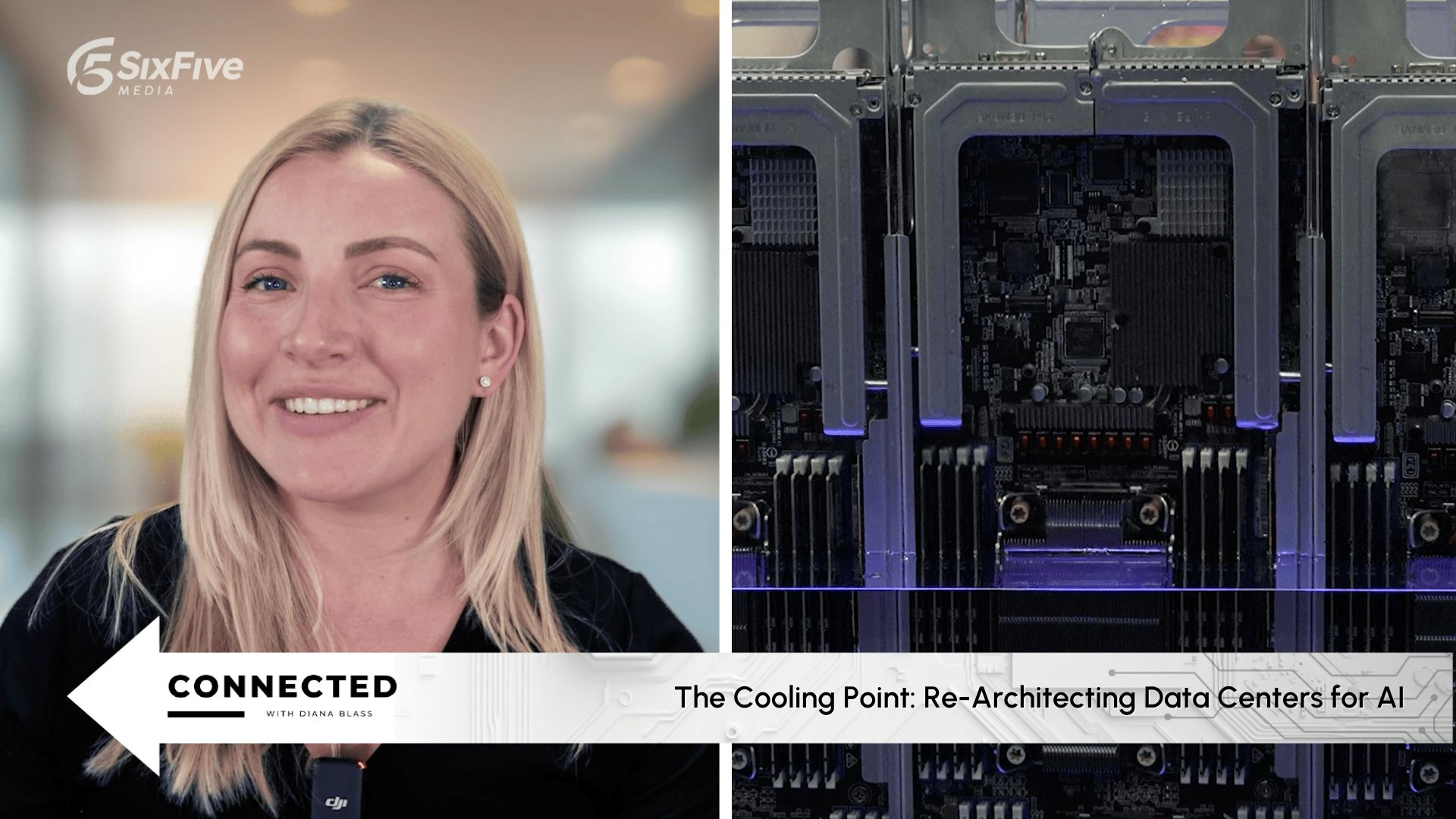
The Cooling Point: Re-Architecting Data Centers for AI - Six Five Connected with Diana Blass
Avi Shetty, Hecheng Han, Dr. George Zhang, Neil Edmunds, John Griffith, Josh Grossman, and Francesca Cain-Watson join Diana Blass to discuss the evolution of liquid cooling in AI systems, exploring design tradeoffs, architectures, and deployment strategies.
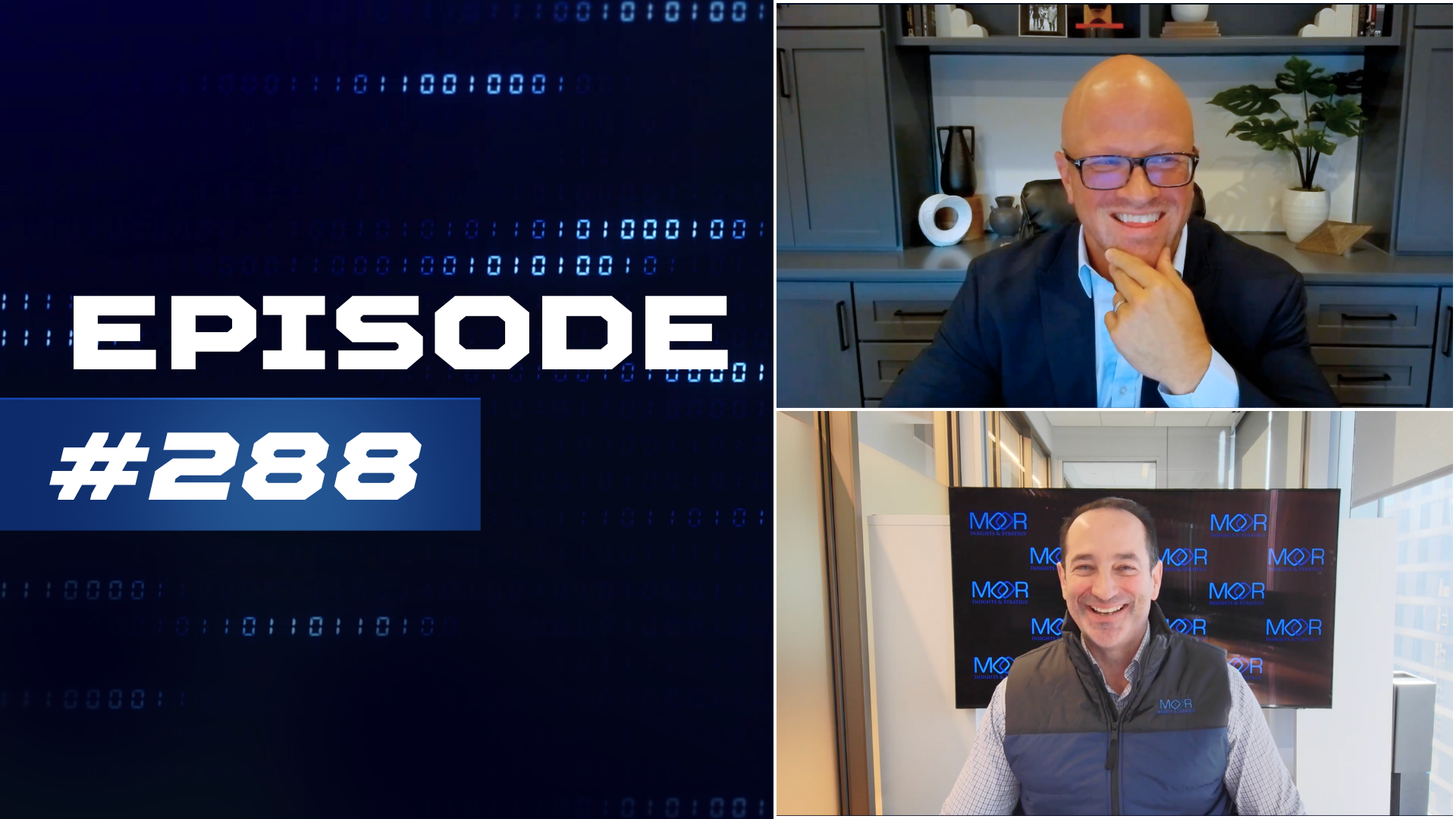
The Six Five Pod | Ep. 288: OpenAI’s Valuation Debate, Marvell’s Network Bets, and the Next Bottlenecks for AI Growth
This week, Patrick Moorhead and Daniel Newman unpack why today’s AI moment feels less like the endgame and more like Netflix’s DVD-by-mail phase—the very beginning of a transformation that will redefine the tech industry. They dig into soaring AI valuations and the growing debate over whether today’s leaders signal durable platforms or bubble dynamics, then shift to what really matters under the hood—AI infrastructure, with a sharp focus on networking and memory, informed by insights from Marvell’s Industry Analyst Day. This episode also breaks down recent market moves across major tech players, before closing with a forward-looking take on where AI is headed and what it will take to stay competitive as the pace of change continues to accelerate.
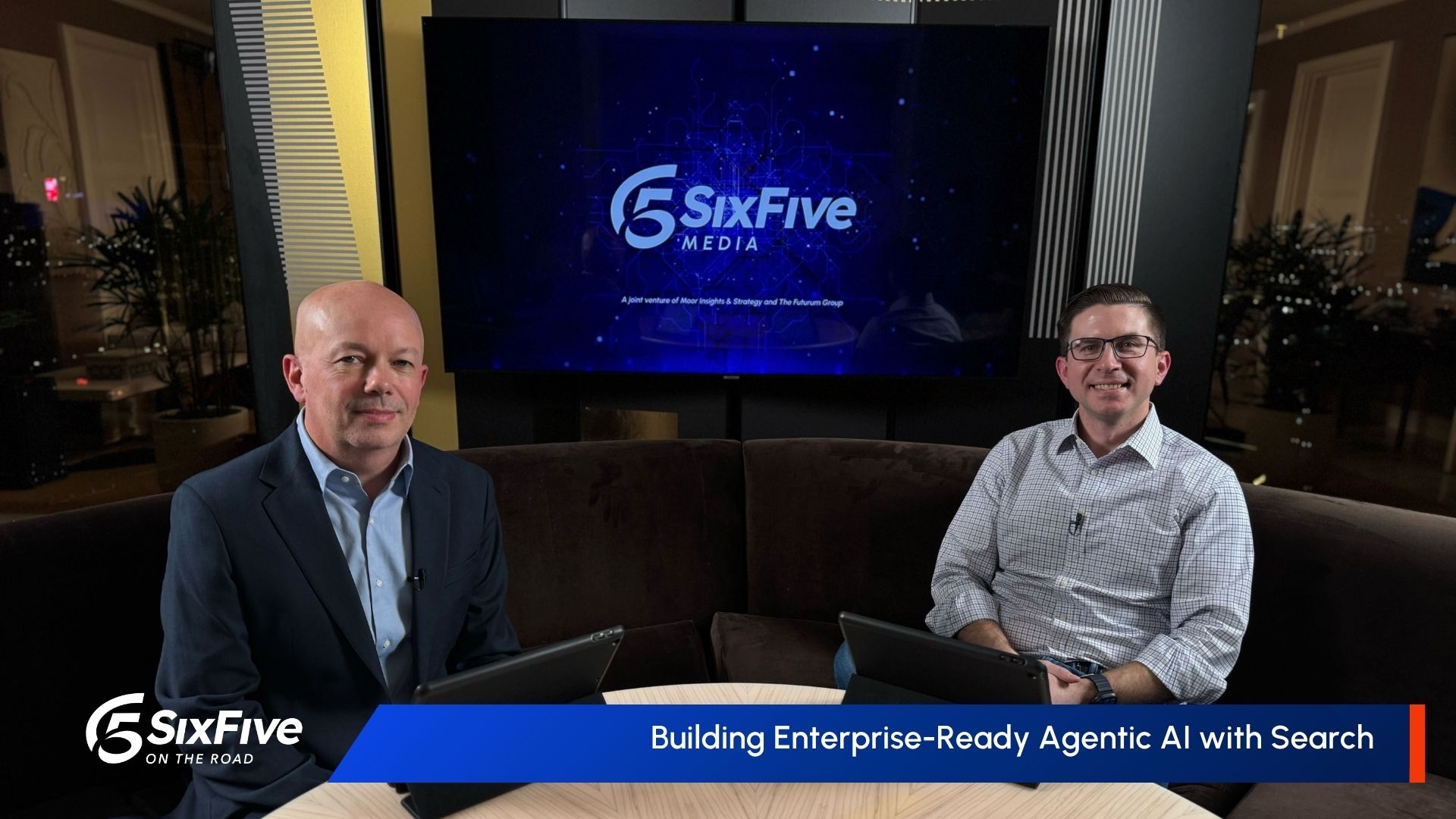
Building Enterprise-Ready Agentic AI with Search - Six Five On The Road
Steve Kearns, GM of Search Solutions at Elastic, joins Nick Patience to share how Elastic is enabling enterprises to move from RAG to agentic AI, solving operational challenges, and powering the next generation of autonomous workflows.
Other Categories
CYBERSECURITY
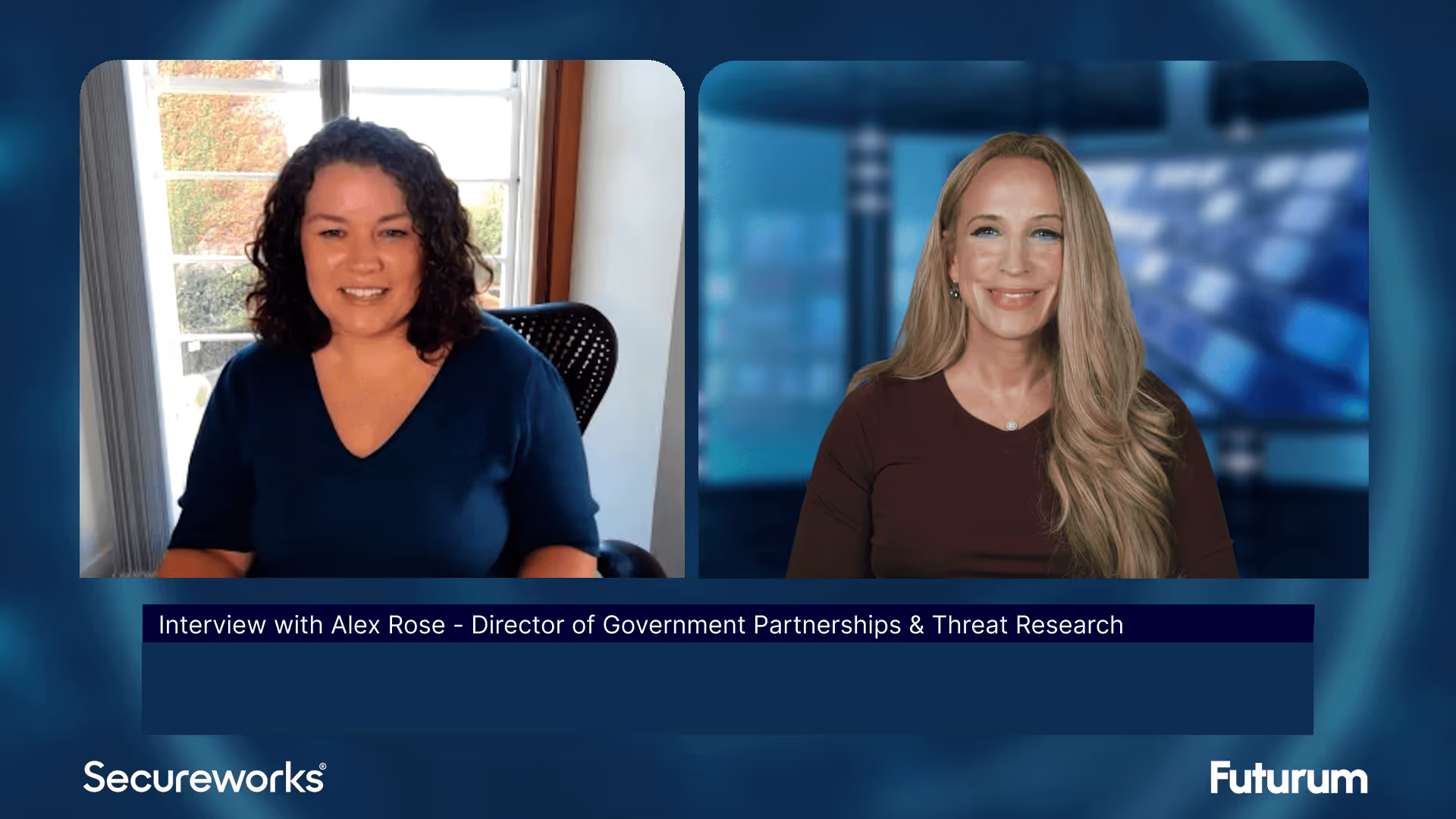
Threat Intelligence: Insights on Cybersecurity from Secureworks
Alex Rose from Secureworks joins Shira Rubinoff on the Cybersphere to share his insights on the critical role of threat intelligence in modern cybersecurity efforts, underscoring the importance of proactive, intelligence-driven defense mechanisms.
QUANTUM
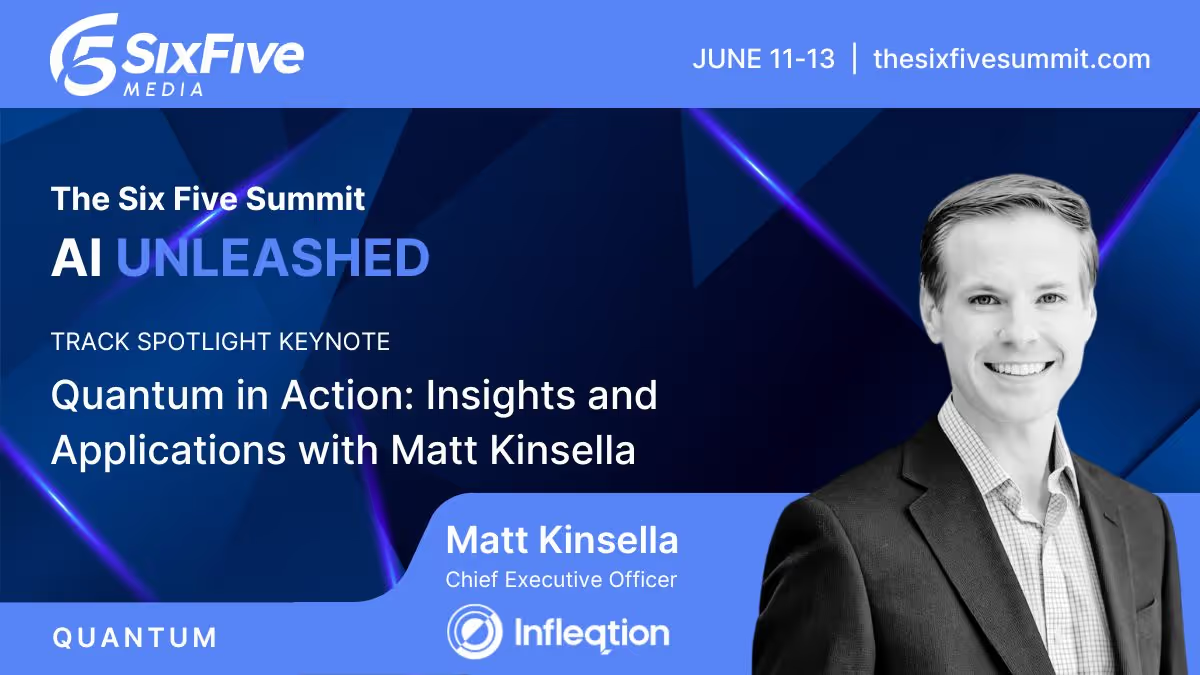
Quantum in Action: Insights and Applications with Matt Kinsella
Quantum is no longer a technology of the future; the quantum opportunity is here now. During this keynote conversation, Infleqtion CEO, Matt Kinsella will explore the latest quantum developments and how organizations can best leverage quantum to their advantage.
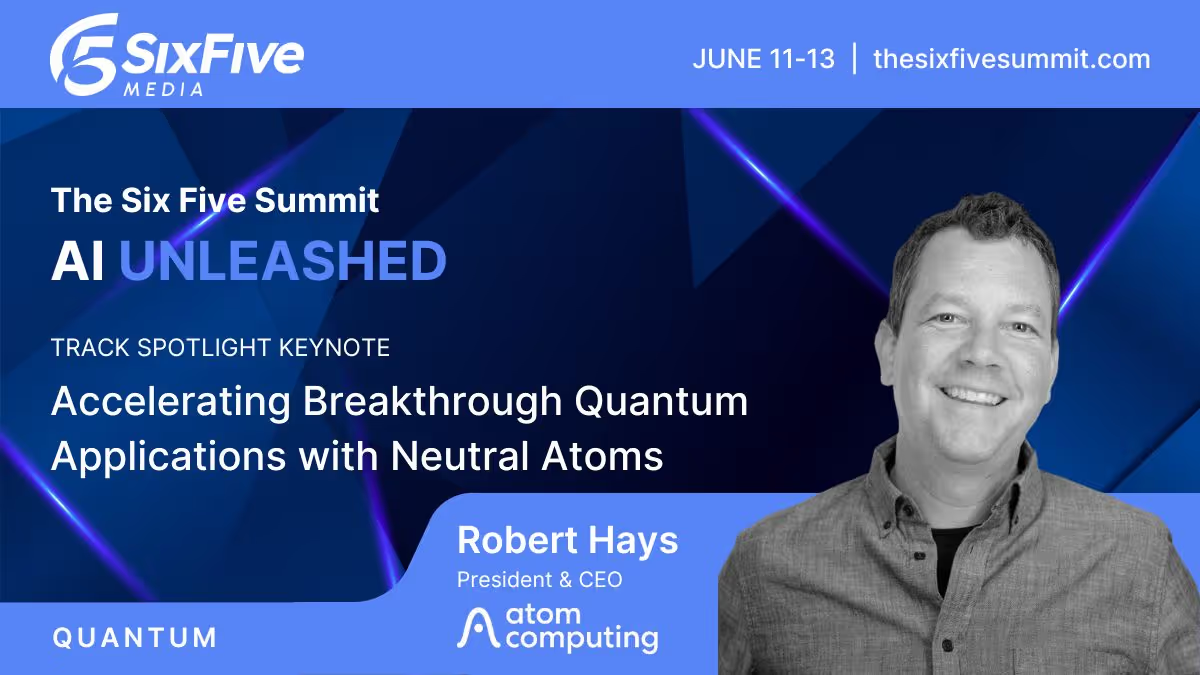
Accelerating Breakthrough Quantum Applications with Neutral Atoms
Our planet needs major breakthroughs for a more sustainable future and quantum computing promises to provide a path to new solutions in a variety of industry segments. This talk will explore what it takes for quantum computers to be able to solve these significant computational challenges, and will show that the timeline to addressing valuable applications may be sooner than previously thought.




